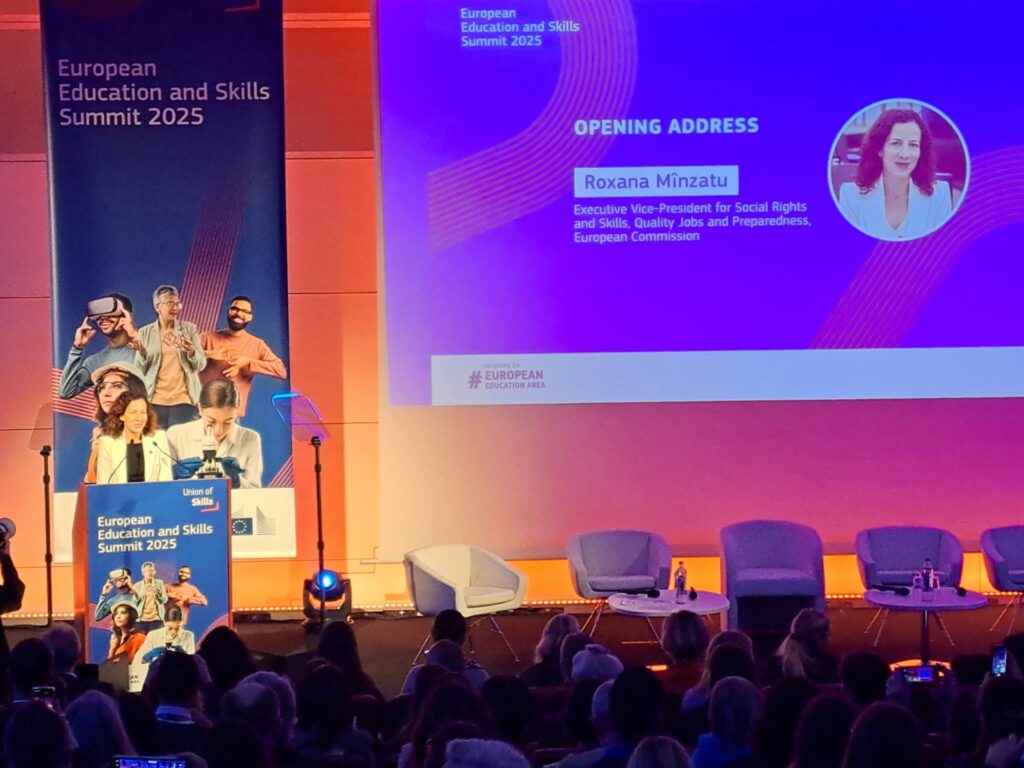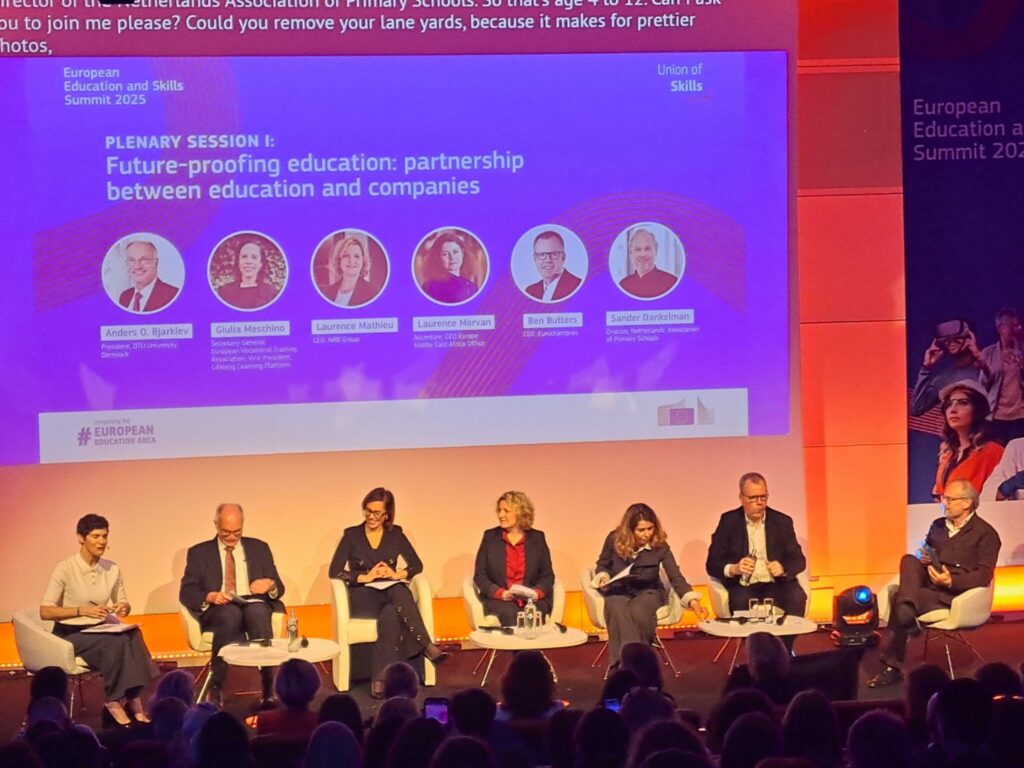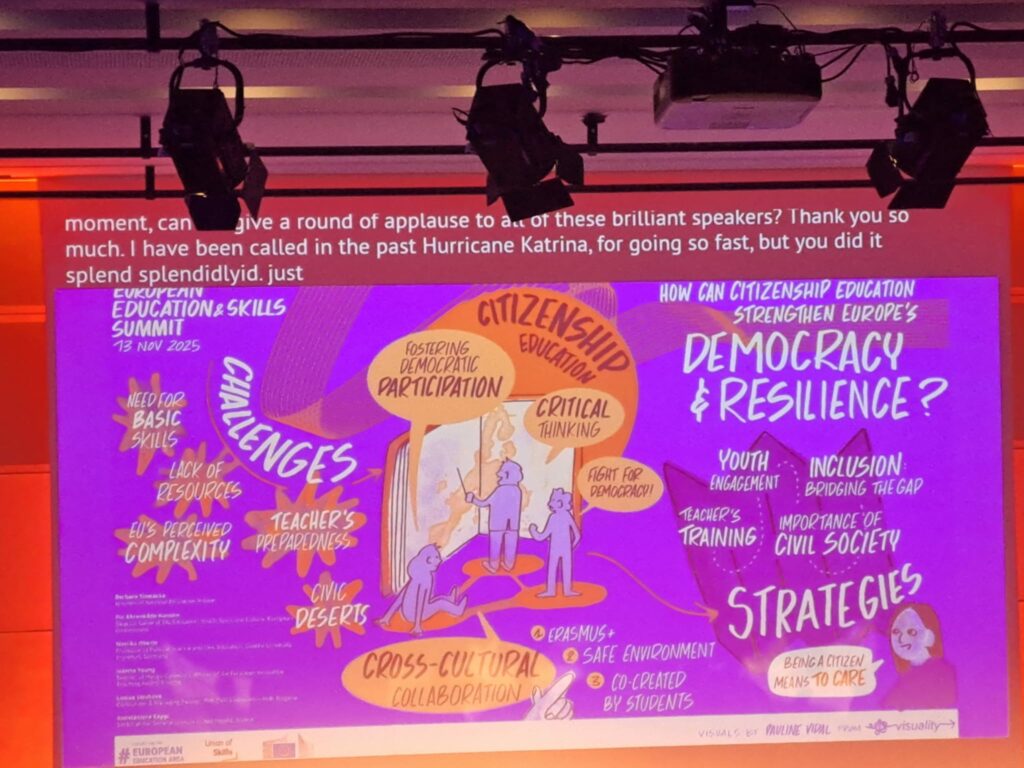European Education and Skills Summit 2025: A Call for Transformation
13/11/2025

Brussels, 13 November 2025 – The 2025 European Education and Skills Summit brought together ministers, policymakers, and stakeholders at the SQUARE Brussels Meeting Centre to tackle the most pressing challenges facing Europe’s education and training systems. As Director of EARLALL (European Association of Regional and Local Authorities for Lifelong Learning), I attended this flagship event to engage with discussions on how education can fuel Europe’s growth, competitiveness, and social cohesion.
Executive Vice President Roxana Mînzatu’s Vision
The highlight of the Summit was the opening address by Executive Vice-President Roxana Mînzatu, who emphasized that “education changes individuals but also communities” – a principle at the heart of regional and local approaches to lifelong learning.
Mînzatu identified three critical areas where Europe is falling short: 30% of European teenagers struggle with mathematics and reading; teacher shortages undermine education quality; and 80% of companies report difficulties finding workers with the right skills.
A Two-Pronged Approach
The Vice-President outlined two priority areas. First, a renewed focus on basic skills and citizenship education – “to run we need to walk first” – supported by the Commission’s Action Plan for Basic Skills. Second, stronger partnerships between education providers and businesses to align learning outcomes with labour market needs.
Funding as a Shared Responsibility
Mînzatu called for Member States to dedicate at least 14% of their budgets to education, doubling the Erasmus+ budget in the next Multiannual Financial Framework (post-2027), and mobilizing private funding through innovative mechanisms, including companies “adopting” schools as part of their corporate social responsibility strategies. The Commission has launched 100 Erasmus+ STEM scholarships as a pilot, but significantly more investment will be needed.
The 2026 Education Package
The Vice-President announced a comprehensive Education Package for next year, including School Alliances to strengthen collaboration between institutions, a renewed VET Strategy to make vocational training more attractive and relevant, and a Teachers and Trainers Strategy to address the profession’s challenges.


Diverse Perspectives, Yet a Critical Absence
The Summit featured rich parallel sessions throughout the day, covering teacher shortages, basic skills, STEM education, vocational training, higher education futures, and lifelong learning partnerships, with an impressive array of ministers, university rectors, business leaders, student representatives, and education experts.
However, a striking gap was evident. Out of 56 speakers, only one represented regional and local authorities: Markku Markkula, Vice-President of the European Committee of the Regions. This glaring underrepresentation is particularly troubling given that regional and local authorities are the primary implementers of education and skills policies across Europe. We are closest to citizens, schools, training providers, and local businesses. We understand territorial specificities, manage education infrastructure, coordinate with local employers, and adapt national and European strategies to local contexts.
The absence of regional and local voices sends a worrying message about how education policy dialogue is conceived at the European level. While rhetoric emphasizes collaboration “at all levels of governance,” the Summit’s programme suggests that regions are still seen as mere implementers rather than strategic partners with valuable expertise to contribute.
A Call for Genuine Multi-Level Collaboration
Executive Vice-President Mînzatu concluded her opening speech with a powerful message: “We need to do it together – sharp minds are a valuable currency.” This captures the essential truth that addressing Europe’s education and skills challenges requires collaboration across all governance levels, from the European Commission to regional and local authorities, and from education providers to businesses and civil society.
Yet for this collaboration to be genuine and effective, regional and local authorities must be present not just in implementation, but in policy dialogue and strategic planning. The Summit’s emphasis on basic skills, teacher quality, education-business partnerships, and shared funding responsibility aligns with the work EARLALL members already undertake across Europe. However, we hope that future editions of this flagship Summit will better reflect the multi-level governance reality of European education and skills policies.
As we move toward the 2026 Education Package, regional and local authorities must be active partners in shaping strategies that work on the ground. Education is not just about individual advancement – it is the foundation for community transformation, economic competitiveness, and Europe’s future prosperity.

